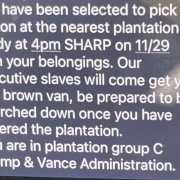Why Trump seeks to create a government of one person
This article originally appeared at Baptist News Global on February 7, 2025.
“Do you believe I am unwittingly supporting the Antichrist?” Benjamin Cole asked BNG Executive Director Mark Wingfield in perhaps the most contentious episode of BNG’s “Stuck in the Middle with You” podcast to date.
In an hour-long conversation on current politics, the temperature started to rise when Cole brought up what Wingfield has written about Trump in recent months: “The way you have spoken of Trump, sort of the Republican Party, those who are complicit in this new fascism is so … it’s so over the top. It’s just so over the top. … You are overstating your case for effect, and I think you do so intentionally.”
But Wingfield countered, “I don’t intend to overstate. I think we understate the case, because I think Donald Trump is the greatest threat to the world we’ve seen in our lifetime. He is a menace. I believe he’s against everything Jesus Christ teaches. I believe he is cruel. I believe he is evil. I believe he is Satan in disguise, and I’m not overstating that.”
Then Cole responded, “I just don’t even have words, really, quite frankly, to respond to that, except to say I think that is so beyond rational.”
“Why is the language from the left so much more extreme now in warning about Trump’s second term?”
The two men went on to discuss past presidents or presidential candidates who people on the opposite side of the aisle could disagree with but not consider to be anti-Christ. But Cole seemed bothered by two questions. Why is the language from the left so much more extreme now in warning about Trump’s second term? And does that mean Trump supporters are unwittingly supporting an Antichrist?
Libertarianism or authoritarianism
I had a similar contentious conversation two decades ago with a friend who became the best man in my wedding. At the time, we both were conservatives. But California was trying to pass laws to lower the risks of second-hand smoke.
“I hope they’re successful,” my conservative friend said.
“Why?” I asked. “That’s big government.”
“Because smoking is sin,” he replied.
“But that doesn’t matter,” I said. “The government shouldn’t have that level of control in our lives.”
Our conversation may not have gone to discussing whether or not one of us was supporting the Antichrist. But it touched on one of the disconnects many of us have today with our Trump-supporting family and friends.
Prior to the 2024 election, whenever we would bring up Project 2025, many of our acquaintances on the right thought we had become the conspiracy theorists, that there was no way Trump was this fascist dictator who planned to do the things we were saying Christian nationalists wanted to do. And when we pointed to Trump and JD Vance’s own words, they’d laugh and say, “That’s just Trump being Trump. He’d never actually be able to do those things.”
My impulse not to ban smoking 20 years ago was the impulse of small-government libertarianism. No matter what my personal beliefs about smoking were, I didn’t want the government forcing others to live according to my personal beliefs. And I believed that because I didn’t want to have to submit to someone else’s personal beliefs. It’s not fun to be on the underside of someone else’s hierarchy.
So if you would have told me back then that I was a fascist authoritarian who is unwittingly supporting the Antichrist, I likely would have laughed and echoed Cole’s words to Wingfield that such an accusation was “beyond rational.” And my guess is many of our conservative family and friends today view themselves in that light. They’ve always voted Republican. They don’t like big government. And Trump’s the Republican candidate. So they vote for him.
“The other impulse in conservatism is authoritarianism.”
But what they don’t realize is there is another impulse at play in conservatism. As illustrated in the story of my conservative friend wanting to ban smoking, the other impulse in conservatism is authoritarianism. He believed smoking was wrong and wanted the government to dictate his morality to the rest of the country in law. This is conservatives at the top of the hierarchy, wielding power over those below.
That’s the impulse Wingfield and many of us on the left are calling out in Trump and Vance. So there are three questions we need to consider:
- Is it accurate to call Trump and Vance’s politics authoritarianism?
- Is this authoritarianism something new for the United States in 2025?
- How does this authoritarianism fit into conservatives’ view of small government?
Vance’s call for the oligarchs
Conservatives have “very few oligarchs on our side,” JD Vance said in 2021. It makes sense that Vance would call for oligarchs, given who funded his rise to power.











Leave a Reply
Want to join the discussion?Feel free to contribute!